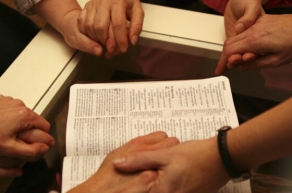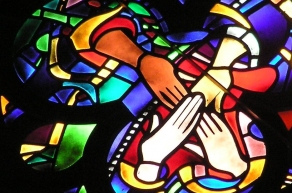
Did you ever think there would be a day when nearly everyone would acknowledge that “we’ve always done it this way” is no longer a valid excuse? I think it’s today.
Those who resisted live online communication are now regular attendees of Zoom worship and meetings. Those who never tried morning prayer are now regularly experiencing it in their home, often with their priest as their guide and prayer leader. Churches that were slow to offer online giving are now scrambling to make it available.
All over the church, creativity and courage are overcoming pandemic fear and isolation. Some examples:
Continue reading...

It’s been nearly 40 years since the 1979 Book of Common Prayer was adopted for use in The Episcopal Church. This means that nearly two generations have been raised in the church experiencing the “exchange of the Peace.” A large number of today’s Episcopalians were raised in other traditions, or in no faith tradition at all, and for them, the exchange of the Peace is part and parcel of being an Episcopalian.
The practice emulates the greeting of Jesus in the post-resurrection gospel stories. Extra-liturgical evidence can be found in the Epistles, as Christians “greet one another with a holy kiss” (I Cor 16:20), and baptismal liturgies as early as the 2nd century record the ministers exchanging the Peace with the newly baptized. It spread from there. But the practice pretty much disappeared from the liturgy in the Church of England in the 16th century, returning in the late 20th century, and in the 1979 Book of Common Prayer of The Episcopal Church. While it took a few years for many Episcopal congregations to get the hang of the practice, after nearly forty years, we are pretty good at it. We shake hands, hug, or nod. “Peace be with you,” we say, or “The Peace of the Lord be with you.”
Continue reading...

On Easter Eve, the United States of America passed a milestone: peak resource use as a result of COVID-19 infections. Every state has a unique peak resource use date. Some have already passed them. Others have yet to. But as a nation, we are starting down the mountain. This according to The Institute for Health Metrics and Evaluation (IHME).
There is no “on” switch to be flipped. Scientists and other health care professionals continue to warn us that restarting a nation as big as the United States will have to be done with great care, in stages, over time. Balancing health concerns and economic recovery from a pandemic will be one of the most extraordinary challenges that our nation, and, in fact, the world, will ever face.
Continue reading...

Church pastor dies a week after contracting COVID-19
This article was published on the Chicago Sun Times Wire Service on Monday, March 30. In this short but moving piece about assistant pastor Angel Escamilla, assistant pastor of the local Assemblies of God church, the lead pastor describes Angel as having had “the spirit of a dove, the strength of a warrior, the faith of Abraham and when he prayed you knew he was talking to Heaven.”
What the first article didn’t say is that he contracted COVID-19 after two weeks of the entire worship team gathering at the church’s worship center to livestream services. It didn’t report that the pastor had told the team that livestreaming from the church was an essential service, and those who didn’t feel that they were essential were welcome to stay home if that made them feel more safe. It didn’t convey the fact that several members of the worship team had also tested positive for COVID-19 and were sick or that the lead pastor had encouraged them to withhold this information from the congregation out of “pastoral concern.”
All of that news was broken by a local investigative reporter in a piece published the very next day.
Continue reading...

I am in awe of the work I see happening across our diocese and around the country to reshape the central gathering of our church. I’ve had the privilege of engaging with some of these leaders and congregations as they map out what this looks like and how this happens. Some thoughts around evangelism and connection as we continue to redefine this work in the coming weeks and months:
Make sure people can find you online.
First things first, make sure people can find your congregation online. Maybe it’s a website, or a Facebook page, but now more than ever, our online presence is essential. We also must make sure folks can find our online worship gatherings easily. For many, this will mean redesigning some pages on our websites so that the landing page and gatherings pages point to both the times and the ways in which people can engage.
Continue reading...

Never let a crisis go to waste.
- Winston Churchill
What do you do when you can’t pass the offering plate? How does congregational giving happen when a pandemic has shut our doors?
Our traditional ways of congregational giving are just one more of our paradigms of church crushed by the COVID crisis. And like our other congregational paradigms that have fallen before COVID19, they are probably gone for good. At least I hope so, because when paradigms collapse in the face of crisis, that means that they are either based on false assumptions or did not adequately address the full reality of human experience.
Continue reading...

The emerging and ever-changing challenges of the coronavirus are really quite daunting. The entire landscape of human gatherings has been changed in rapid succession. And yet COVID-19 has encouraged amazing creativity on the part of Episcopal worshipping communities, clergy, and lay leaders. We’re not normally early adapters, we Episcopalians, nor are we the quickest when it comes to innovative technology, but we’ve leaned hard into some new territory – connecting people who cannot be together in person. No one wanted to learn adaptive leadership and remote technology in this way, but many have learned – and learned it on the fly and really quite well.
YouTube channels have been created or, in some cases, more populated. Zoom is the tool I’ve been using, and we experienced this past Sunday the struggle of getting so many Zoom accounts to go live on Facebook at the same time! Facebook live is another popular option. The good news is that we’re learning together how to do church in a virtual space. Many can see what’s going on in other faith communities as well as share pro-tips and horror stories.
Continue reading...

If the Constitution and Canons of the 1920s Episcopal Church were anything like what they are today, the prayers and rites of the 1928 Book of Common Prayer would have been vetted over 6-9 years. Which means they were largely written in the shadow of the 1918 influenza pandemic. It’s no wonder, then, that the 1928 BCP includes this prayer, In Times of Great Sickness and Mortality:
O Most mighty and merciful God, in this time of grievous sickness, we flee unto thee for succour. Deliver us, we beseech thee, from our peril; give strength and skill to all those who minister to the sick; prosper the means made use of for their cure; and grant that, perceiving how frail and uncertain our life is, we may apply our hearts unto that heavenly wisdom which leadeth to eternal life; through Jesus Christ our Lord. Amen. (The Book of Common Prayer, 1928, page 45).
Continue reading...

How can our congregations do effective outreach while the COVID 19 pandemic makes social distancing necessary?
How can our congregations contribute to controlling the Coronavirus?
These are two important questions to ask and answer during the current pandemic (and there are likely many more)...
First, ground yourself in hard data from reliable sources about Coronavirus and COVID19: What is it? What does it do? How does it spread? How can people both protect themselves from the virus and avoid spreading it to others? How do you know you might have it? What do you do if you think you do? What COVID-related resources are in your area?
Reliable, data-grounded sources and resources include:
Continue reading...

In our previous post we talked about how a faithful response to the current pandemic involves more than simply live streaming worship services (congregations do not live by worship alone), but involves finding creative and experimental ways to do and be all the things that churches (and other faith communities) are supposed to be and do, and especially how we exercise our “burden of care” to our neighbors and neighborhoods. And that our responses may ultimately lead to our congregations and the communities they serve surviving and thriving together.
Subsequent posts will deal with each of those things in turn. But let’s start with what we learned from our recent experiment with online worship (last Sunday), in cooperation with Church of the Ascension in Gaithersburg, which reached 51 people on Zoom and 900+ on Facebook Live.
So what did we learn?
Continue reading...

The COVID19 pandemic is not the first time Christianity has been faced with the moral question of how to respond in the face of pandemic. In fact, the question is nearly as old as the Church itself. One of the first times was during the third century Roman plague. Something likely akin to Ebola, the so-called Cyprian plague (after Bishop Cyprian of Carthage) which ravaged the Empire from 250-270 CE.
Just as they had in the Antonin plague of the second century, the powerful and well-to-do of the Empire fled the cities for the relative safety of their countryside villas, leaving the rest of the populace to fend for themselves. As attested to by both Christian and secular writers of the time, just as they did in the previous plague, the Galileans (as they were called) did the opposite, staying behind and even coming in from the countryside to feed the poor, care for the afflicted, comfort the dying, bury the dead, and to attend to public hygiene, doing this not just for the faithful but for their entire communities, Christian and non-Christian alike. It was, as Bishop Cyprian put it, their burden of care. Two remarkable things happened: they helped curb the contagiousness of the plague (the death rate was as much as 50% lower in cities with Christian communities) and the plague (or rather their response to it) helped make Christianity extremely contagious, so that it spread rapidly throughout the Empire.
Continue reading...

“Where can I buy that study guide?” a parishioner asked me ten years ago when I launched St. George’s Sunday morning bible study. There was not then, nor is there now, a bookstore in St. Mary’s County, Maryland. There was a used book store in our County seat, but I wasn’t sure they had multiple copies of the study guide for Romans; in fact, I was certain they didn’t have a single copy.
“Amazon,” was the answer I had in my head, but instead I offered to pick up a bunch of copies the next time I was up the road at the Virginia Seminary. Now, even that Seminary doesn’t have a bookstore!
Continue reading...

More than ten years ago, when many of us were first learning about the ‘nones’ – those Americans and, among them, increasing numbers of young adult Americans who reported they had no religious tradition whatsoever – the Barna Group revealed that an astonishing percentage of young adults say Christians are judgmental. Drilling down in the perceptions of Americans age 16-29, Barna reported: “…Among young non-Christians, nine out of the top 12 perceptions were negative. Common negative perceptions include that present-day Christianity is judgmental (87%), hypocritical (85%), old-fashioned (78%), and too involved in politics (75%) – representing large proportions of young outsiders who attach these negative labels to Christians. The most common favorable perceptions were that Christianity teaches the same basic ideas as other religions (82%), has good values and principles (76%), is friendly (71%), and is a faith they respect (55%).”[1]
[1] “A New Generation Expresses its Skepticism and Frustration with Christianity,” The Barna Group. September 21, 2007. https://www.barna.com/research/a-new-generation-expresses-its-skepticism-and-frustration-with-christianity/
Continue reading...

I’ve spent a great deal of my ministry in St. Mary’s County, Maryland – the southernmost tip of the Diocese of Washington – connecting with other leaders in other churches, especially other Episcopal churches. I’ve built collaborative networks with other church leaders and, indeed, churches. In time, we have built a truly collaborative business model – two parishes becoming one parish (merging), something beyond the obvious limitations of the ‘one parish, one priest’ model.
This has been good work. Also, it’s essential work. Anyone who’s served on a vestry in, say, the past fifty years, or any clergy leader in The Episcopal Church today knows how essential this work is. There really is no other way we can keep open, let alone encourage every single Episcopal congregation to thrive unless we work together and find new, more sustainable business models.
That’s the straightforward message, and a message I’ve been crafting and working toward for more than a decade in ministry.
Continue reading...

If you say, “We need to make some changes around here,” people get nervous. Less resistance may come if you ask, “What gifts/talents do we have that we can use in ministry?” But even with such an “appreciative” approach to change, congregations may not have the vision or confidence to try something new to serve others outside the congregation.
Let’s face it – inside ministry is easier. Inside our faith communities, we know each other. We have people among us who have needs and we know where to find them and, generally, they look and sound like us. Sure, we can love outsiders, increasing our welcoming to people who walk through our doors. We can give money to or volunteer with agencies who serve those with socioeconomic challenges.
But do these actions involve change to move us out of our comfort zones?
Continue reading...

In our congregations as well as dioceses we oftentimes have the opportunity to hire a new staff person whether a youth director, financial officer, musician, administrator or sexton. A question for us all is whether we are using good HR (human resource) practices to hire these individuals or are we filling these positions with “Family and Friends”.
Recently at our commission meeting we compiled a list of best practices for lay positions which are below. Do consider as leaders how well we are adhering to these items.
· Form search committees for appropriate lay positions across the church
· Utilize best practices for the job search process to maximize interest from lay people
· Determine whether positions being considered for clergy can also be performed by lay
· Determine whether lay positions being considered are for Episcopalians only or can be filled by those familiar with the Episcopal church
Continue reading...

A few years ago, I wondered aloud about whether, or when, The Episcopal Church would catch up to a growing phenomenon in Christian churches – multisite church planting and multisite church development. It was something I was reading about, especially because I was at the time serving one Episcopal congregation as rector while making plans to take on a second call with our neighbor church. That call developed and, as I’ve also written about, St. George’s, Valley Lee and Ascension, Lexington Park – two courageous congregations in the Diocese of Washington – have moved from conversations with one another to ‘yoking’ (an informal term for sharing everything, just not becoming one church) to merging.
I wondered a few years’ ago whether The Episcopal Church could borrow some multisite thinking. “We tend to see ourselves as one church,” I wrote, “at least theologically and spiritually as set in the landscape of other denominations. …Can this category apply to Episcopal congregations and communities in our church? And, if so, how? If not, why not?”
Continue reading...

The latest parochial report statistics are out, and the annual hand wringing over decline has started. With all of the questions being asked (and blame being placed) around the statistics and what it means for us as a church body, I was reminded of a book I recently read.
General Stanley McChrystal’s book, Team of Teams: New Rules of Engagement for a Complex World, discusses how he and his team redesigned Special Operations in Iraq to fight Al Qaeda, and how such lessons can be applied to all kinds of organizations in both the public and private sectors. He didn’t mention the church, specifically, but so much of what he wrote applies to us as well.
What Gen. McChrystal realized was that he was leading an organization that was designed to fight previous wars, and he and his team were wholly unprepared for the new context in which they found themselves.
Continue reading...

For many years, books about healthy congregations focused on how to do what we’ve always done better, or at least in a more attractive way. One book capturing attention today asserts that what we’ve always done is not likely to work, no matter how well we do it.
Canoeing the Mountains: Christian Leadership In Uncharted Territory, by Tod Bolsinger, takes a frank but hopeful look at the opportunities for adaptive leadership within the church today. The title is a reference to the ways that explorers Lewis and Clark had to adapt to the unexpected reality of the Rocky Mountains as they sought a riverway to the Pacific.
Continue reading...

The word “millennial”, once uttered, causes a reflex of eye rolls. I was not particularly eager to hold the title of being a millennial. The thought of millennials seems off-putting with the generations that came before mine.
I am a Navajo, Second Generation “Cradle” Episcopalian Millennial Woman. What does this mean? It means I am full of hope and wear moccasins and a ton of turquoise to national church functions. As Nadia Bolz-Webber said, “You’re winning in the jewelry category,” at the 2019 Episcopal Communicators Conference. My generation adapted through the rapid advances in technology thus we are more accepting of change and our surroundings.
Continue reading...



















